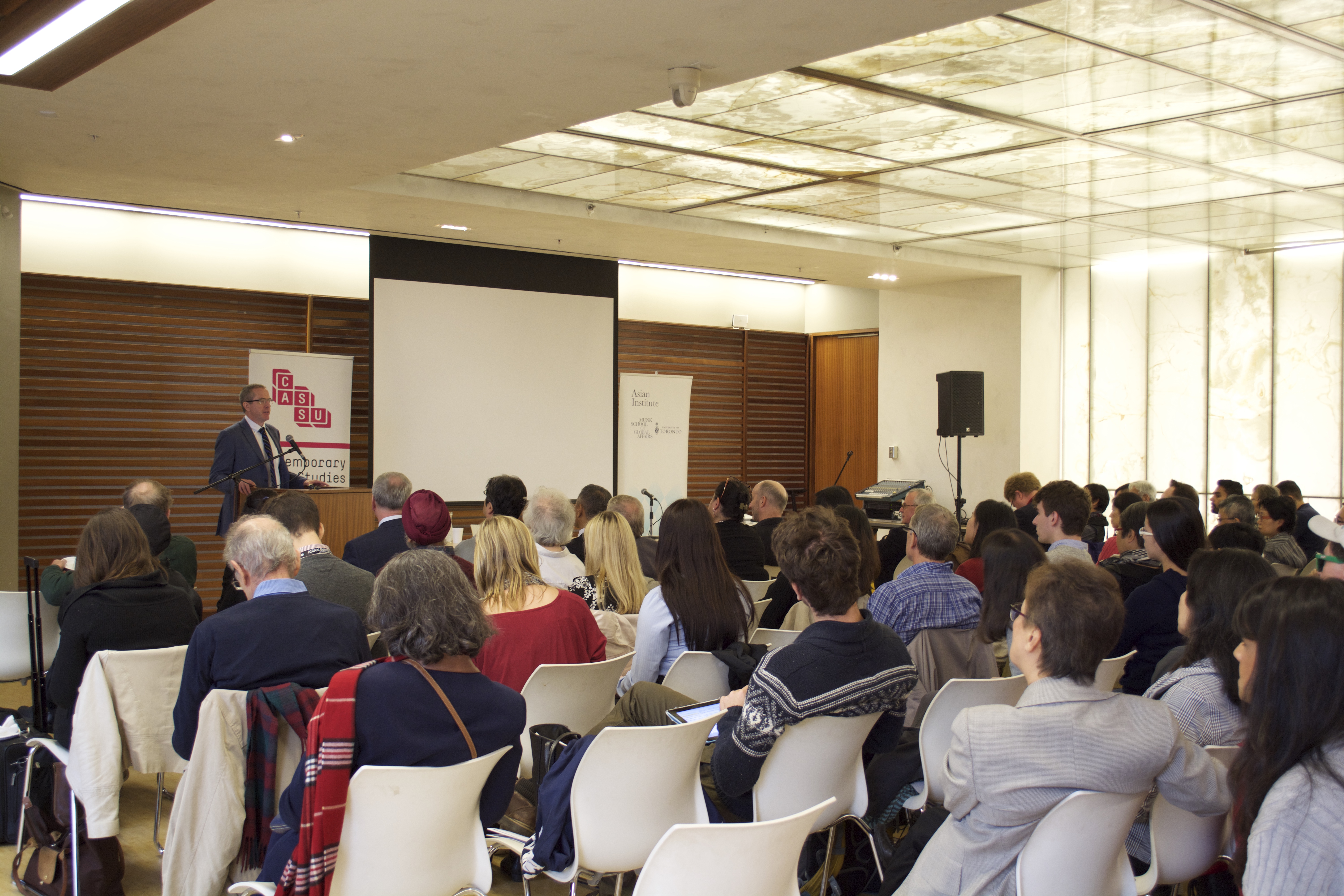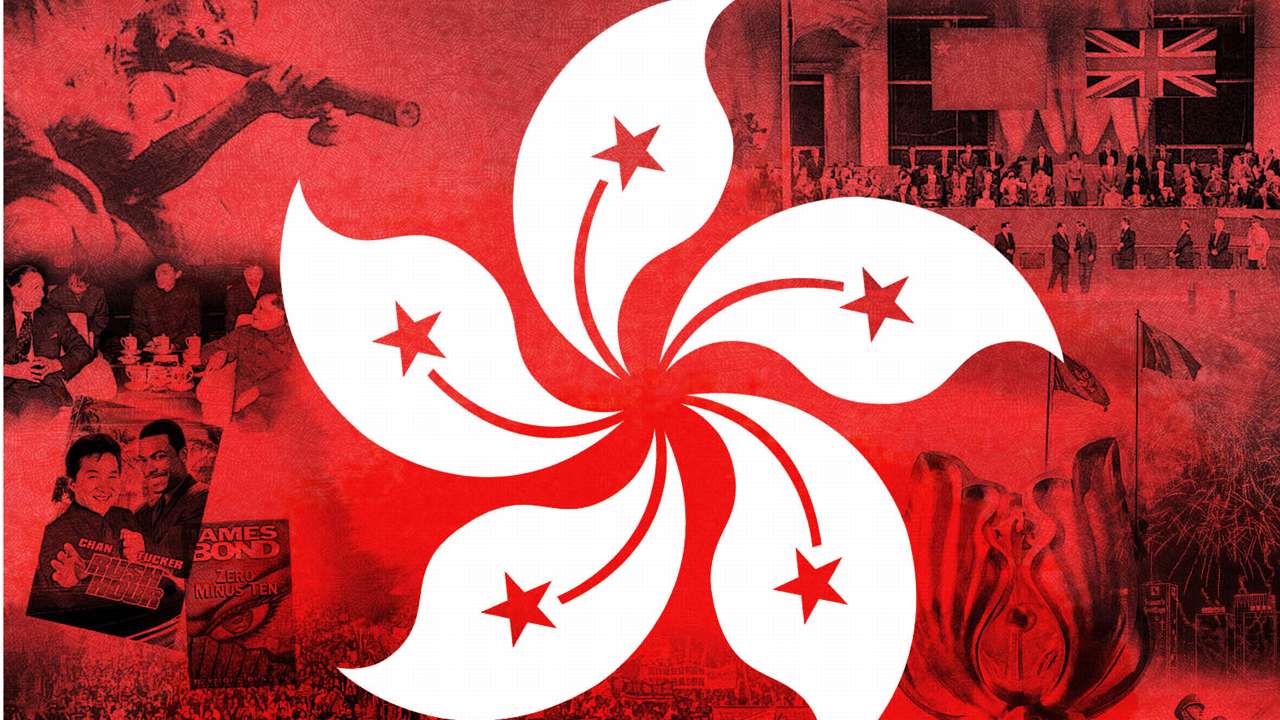
The first speaker was Ambassador Joseph Caron, a Former Canadian Ambassador to Japan, who began the panel by discussing Japan’s foreign policy and its continuing evolution. In beginning his presentation, Caron focused on the features of Japanese “island mentality” and how the geographic feature of the island nation influenced Japan’s isolationist instincts in drafting foreign policy. Ambassador Caron noted that Japan’s modern-day development contradicts its historically isolationist mentality and sporadic interactions with mainland Asia, being exemplified by the fact that Japan imports 60% of its food. However, Caron explains that only through this opening of the nation did modern Japan develop as a highly educated and economically powerful society, exemplified by its contribution to the United Nation (notably contributing 10% of the UN budget). Consequently, Caron notes that the notion of isolationism no longer coincides with Japan’s demands for self-security and self-sufficiency. The contradictory “island mentality” is evident in Japan’s diverse response to security issues, with opinions ranging from maintaining a rigorous pacifistic policy to far-right nationalist views of allowing military expansion. Caron maintained that Article 9 of the Constitution, regarding outlawing war to settle political disputes, is a prime example of the struggle between greater control of their security and emotional dimension of the historical instincts regarding its “island mentality”.
Further expanding on Japan’s foreign relations, Ambassador Caron briefly analyzed Japan’s relations with the United States, China, and Canada. Ambassador Caron stated that the US sees Japan as a major operating base in East Asia and thus Japan’s self-enforced isolationist tendencies detract from its potential in the eyes of the US. In discussing Sino-Japanese relations, Caron specifies that Japan’s 2000-year long interactions with its eastern neighbour have been mixed. Not only does this refer to the intertwined cultural and economic ties, but also the conflicting interests regarding China’s rising military capability and Japan’s demographic distribution to the east coast. Ambassador Caron also discussed Japan’s significance to Canada as a trading partner for Canadian goods. Caron determines that Canada’s natural resource industry is dependent on the bilateral engagements with major consumers such as Japan.

Professor Andre Sorensen, specializing in Urban Geography at the University of Toronto, was the second speaker in this conference. Professor Sorensen specifically focused on the demographic decline of Japan and presents the projection that, by 2040, the negative birth rate would lead to a population decrease of an estimate of 20 million people. In examining the possible solution of immigration, Sorensen states that Japan’s strict immigration laws do not contribute in solving the problem, given the need for approximately a million immigrants per year to level out the negative birth rate. Sorensen state that this demographic decline in its current state is already being exemplified through different problems such as a declining property prices and large quantities of abandoned properties, especially in areas surrounding urban centers. These consequences also exacerbate challenges for the national economy, including a declining workforce, high youth unemployment, and decreasing consumer demand.
In producing a specific case example, Sorensen specifically analyzed the demographic effects on government’s effort to promote development of the capital’s central areas. As Sorenson states that the government is prompted to increase funding for urban development because of the migrants attraction in Tokyo, this has transformed Tokyo into a greater centre of investment. However, this development of Tokyo presents several major problems such as the declining economic situation of the city’s periphery areas, the construction of sub-standard housing in the city, and the concentration of people in natural disaster-prone areas of Tokyo. Sorensen concludes that although this current policy of managing Tokyo is problematic, there are long-term alternatives such as the greater redistribution of migration and funding, which could possibly help confront current challenges and rectify the situation in the long run.

The third and final speaker was Professor David Welch, a professor at the University of Waterloo and senior fellow at the Centre for International Governance Innovation in Global Security. In his presentation, he addressed the current controversy over the revision of the Japanese Constitution, especially in regards to Article 9 of the Constitution. He specifically stated that Article 9’s provisions, being Japan’s renouncement of war as a sovereign right and the legitimate use of force as means of settling international disputes, were the contentious issues in question. Although Welch states Japan is unique in its rejection of this sovereign right to war, Japan’s maintenance of their well-armed self-defence forces violate Article 9 regardless. This is deemed by the Professor as a reasonable violation, noting that Japan’s military maintenance is reasonably relative to the size and international significance of the nation. Welch believes that the opposing opinions to the revision of Article 9 stem mostly from political differences, especially due to the population’s dislike of Prime Minister Abe who led government initiatives in this matter.
In his attempt to answer the questions regarding possible pros and cons of the issue, Professor Welch continued by presenting five arguments for each side of the debate. In favour of revision, Welch stated that the amendment allows Japan to reconcile its constitutional inconsistency in operating the Self-Defence Forces, to realize its potential in contributions to international security, to allow manifestation of the cooperation treaty with the US, to enhance deterrence and defence, and finally to overrule the persistent myth of Japanese militarism. In opposition to the revision, Professor Welch argued that this may promote remnant fear of the revival of militarism, receive hostility from its neighbours, damage the nation’s pacifistic identity, undermine Japan’s soft power and moral authority, and lead to entrapment within American foreign policy. The most pertinent argument in rejection of an amendment was the response from Japan’s neighbours, the victims of Japan’s abuses in the 1920s and 1930s. Professor Welch argued, however, that such anger should be very temporary, especially given Japan’s cultural exports to such nations and Japan’s inherent pacifistic qualities. Professor Welch believes that it is in Japan’s long-term interest to amend Article 9, although this is highly unlikely given the lack of mechanisms for reform in Japan’s Constitution.

In conclusion, the Japan Today Conference highlighted several contested issues in Japan, with a special focus on Japan’s foreign policy and domestic policy on declining demographics and resettlement patterns. The concurrent relevancy of the topics was reflected in the Question and Answer period, where each panellist showed the interdisciplinary nature of the topics discussed. These subjects are key cornerstones to the understanding of modern Japan and this conference provided a highly professional and academic construction of Japan while being informative to the general public.
Timothy Law is a 3rd Year student studying International Relations and Peace, Conflict and Justice Studies at the University of Toronto, Victoria College. Currently, Timothy serves as an event correspondent and editor for Synergy: The Journal of Contemporary Asian Studies.








